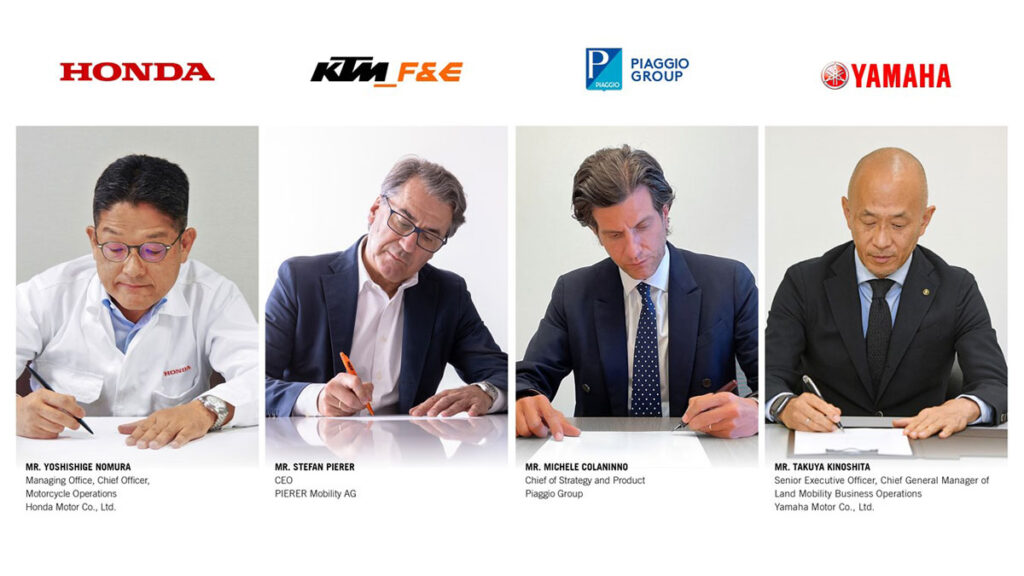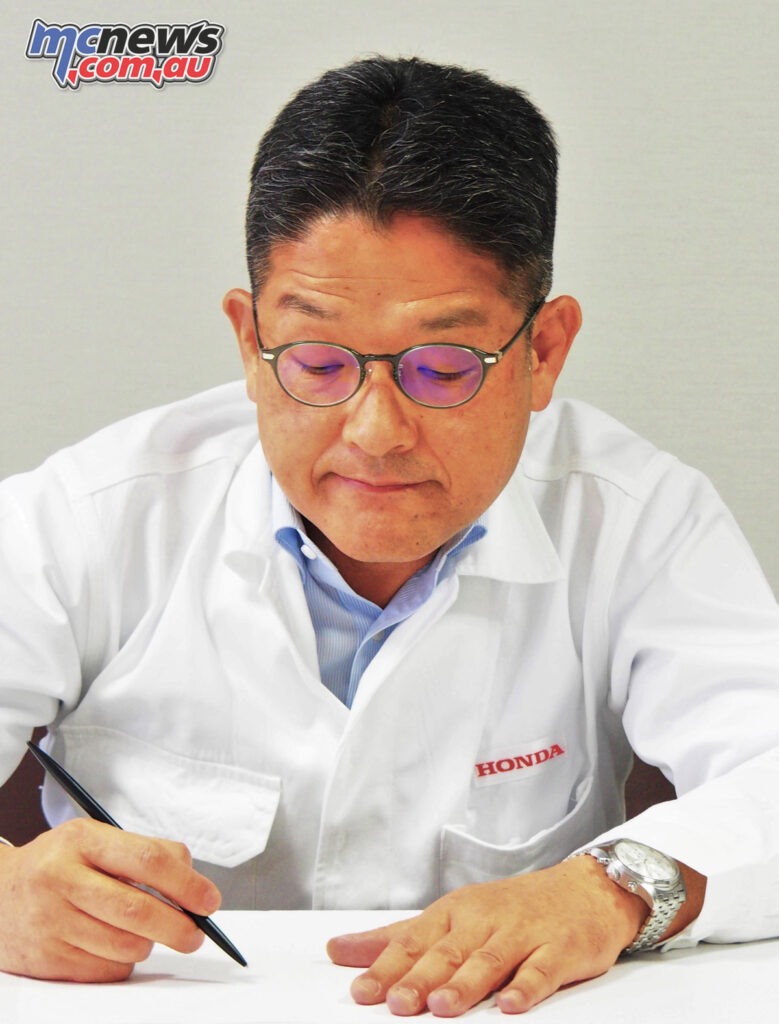Yamaha, Honda, Pierer Group & Piaggio enter battery consortium
Some of the world’s largest motorcycle manufacturers are teaming up in what looks like an attempt to get ahead of the electric game in regards to true practicality by developing a universal, swappable battery system, that aims to become an industry standard moving forward if successful and widely adopted.
The move could be a win for riders, helping ensure a wider and more competitive battery market, rather than each brand having their own specification of battery. It could also make ‘recharging’ as simple as stopping into a charging station and simply swapping batteries, rather than actually needing to wait, although the logistics and implementation of this kind of system are still being finalised.

Following the earlier announcement about a letter of intent on the same topic, it’s now become reality, with four major players signing on. Swappable batteries are looking like a necessity in two-wheeled electric vehicles, unless we see enormous jumps forward in battery tech, charging or electric vehicle efficiency, that would allow greater range capabilities and much faster charging.
Yamaha, Honda, KTM and Piaggio Group have officially signed an agreement to create the ‘Swappable Batteries Motorcycle Consortium’ or SBMC, which aims to promote the use of light electric vehicles, including motorcycles and scooters, with a focus on sustainable batteries and low-voltage electromobility.
The four primary goals of the consortium have been outlined as developing common swappable battery systems, implementing their use, promoting their system as a common specification standard for both Europe and eventually the rest of the world.
That will mean working with national, European and international standardisation bodies, to tackle the vast differences between charging infrastructure between countries, with development of such infrastructure also looking to be a focus, with the goal of promoting light electric vehicle use.
The four founders are encouraging interested stakeholders to join the consortium.
Stefan Pierer also clarified that these batteries will be up to 11 kW capacity, for low-voltage vehicles, with bikes like the current Harley-Davidson Livewire for comparison running a larger 15.5 kWh battery, still resulting in a limited range compared to traditional motorcycles, as well as fairly lengthy charging times.
This likely signals an overall focus more on urban commuter machines, which only need fairly limited ranges, as opposed to machines capable of replacing motorcycles capable of longer distances and higher performance, although obviously the swappable and universal battery systems could also extend to these machines in the future, or may see multiple batteries used.
In mobile phones we’ve seen a push for universal charging cables for instance meet reasonable success, however batteries themselves are a different story, with phones, laptops and cameras generally running model specific batteries, with many manufacturers not even running the same batteries across most of their product ranges. In the same vein even power tools with swappable batteries run their own proprietary systems and ecosystems.
This is in comparison to the older battery systems, with universal battery sizes (AA, AAA, 9V, etc) which used to power many portable devices, but don’t seem to have found the same success in rechargeable versions, even if they continue to be used as throw-away options.
Takuya Kinoshita – Yamaha Motor Co
“The Swappable Batteries Motorcycle Consortium in Europe is finally ready to get to work. I hope that this first step forward will be a beacon that draws like-minded parties to our mission and leads to transformative changes for the future. We at Yamaha Motor are confident that through this initiative, we can help unify the differing technical specs and standards and contribute to maximizing the merits of electric power for customers around the world.”
Yoshishige Nomura – Honda Motor Co
“Honda believes that the widespread adoption of electric motorcycles can play an important part in realising a more sustainable society. For that purpose, we need to solve several challenges such as extending the range, shortening the charging time and lowering the vehicle and infrastructure costs to enhance convenience for customers. In the Consortium we have created, the founding members from the motorcycle industry and other stakeholders will work together towards standardizing swappable batteries, their charging systems and surrounding infrastructure to create the environment for their use. Our final goal is to ensure that motorcycles will continue to be chosen as a useful method of transportation in future mobility.”

Stefan Pierer – Pierer Mobility AG
“The signing of this Consortium agreement is a key step in ensuring that PIERER Mobility AG, can continue to move forward, deliver innovation at pace, and advance its clear strategic vision for electric powered two-wheelers. Together with our partners, we will work to deliver a swappable battery system for low-voltage vehicles (48V) up to 11kW capacity, based on international technical standards. We very much look forward to ensuring that powered two-wheeler vehicles maintain their role in the future of both urban and nonurban mobility.”
Michele Colaninno – Piaggio Group
“Urban mobility is going through a delicate moment of transition towards electrification. Thanks to our Consortium, representing four major global players, motorbikes will continue to play a key role in the urban context. Swappable batteries give the right answer to speed up the recharging time of vehicles offering an additional valuable choice for users. Urban mobility is part of the Piaggio DNA and history: our aim is to bring all our technological know-how and attitude for innovation to the Consortium.”























